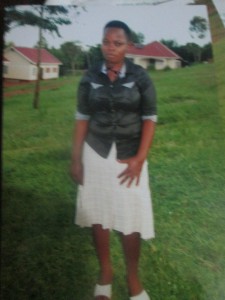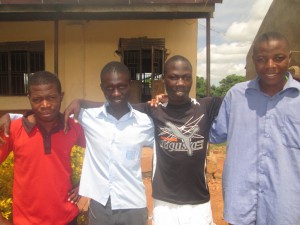 Isaac Newton High School, Masaka has just chalked up the best A-level Exam results in its short history. Of 25 students entered for the examinations, 9 gained passes in 3 A-level subjects, 7 passed 2 subjects and 9 students passed in one subject. The table below shows the distribution of grades awarded, which is remarkable for a rural school and surpasses those of other schools in their District.
Isaac Newton High School, Masaka has just chalked up the best A-level Exam results in its short history. Of 25 students entered for the examinations, 9 gained passes in 3 A-level subjects, 7 passed 2 subjects and 9 students passed in one subject. The table below shows the distribution of grades awarded, which is remarkable for a rural school and surpasses those of other schools in their District.
Top performing A-level student in 2013: Rebecca Nakayiwa (right)
At Isaac Newton School, several students met the minimum requirements for a government scholarship to study for a university degree. Scholarships are highly prized. They cover university fees and contribute towards a student’s living costs. Unfortunately, in practice, scholarships are thin on the ground and are more likely to be awarded for science courses than for arts ones. In Uganda a certain number, limited by national funds available, are awarded each year on a mandatory basis to the very best performing students. To ensure fairness between parts of the country, others are awarded on a regional quota basis. All scholarships are awarded strictly on merit. Unfortunately, there has been less money available at national level in 2014 as a number of countries, e.g. those in Scandinavia, have suspended official aid to Uganda due to concern over the illiberal homosexuality bill that has been working its way into law.
|
2013 A-Level Uganda Advanced Certificate Results |
|
| Grades |
A
|
B
|
C
|
D
|
E
|
O
|
F
|
| Isaac Newton |
1
|
8
|
11
|
17
|
11
|
20
|
4
|
* A-level points: The grades for A-levels and subsidiary subjects are aggregated into an overall points score (A=6, B=5, C=4 and so on). The points aggregate determines entry to more advanced study. Any double-digit aggregate (the equivalent of two grade Bs or better) could secure a place in a good university.
At Isaac Newton High School the two top performing students were:
Rebecca Nakayiwa (above right) gained 15 points from an A, B and D in Arts subjects with a 4 in subsidiary Mathematics. Her best subject was Luganda. Rebecca was funded up to O-level by a scholarship provided by a UHST supporter. As an Arts student, Rebecca is still waiting to hear whether she will be awarded a regional quota scholarship to attend university.
James Kemigisha (below right) gained 14 points from a B, B and D with a 5 in subsidiary Mathematics. His best subjects were Economics and Agriculture. James has already been awarded a mandatory scholarship to study for a degree in Agricultural Development, Rural Transformation and Innovation at Kyambogo University.
At least 10 students have gained grades that would get them onto a university course. However, most will only be able to go if they can find the fees required. Since education was liberalised in Uganda many new universities have been established. The lower tier institutions charge £100 per term for Diploma courses and £200 for degree courses. However, the more highly rated universities and courses charge considerably more than this. Such fees are generally prohibitive for students from a rural background.
 Successful students: Lukenge Alexander, Kasasa Peter, Ssenkabirwa Nicholous, Kamugisha James (all with temporary teaching posts at the Mbute Campus of Isaac Newton)
Successful students: Lukenge Alexander, Kasasa Peter, Ssenkabirwa Nicholous, Kamugisha James (all with temporary teaching posts at the Mbute Campus of Isaac Newton)
In order to help students to save some money towards their university expenses Peter Kisirinya gives his best performing students temporary teaching posts at Mbute and Kateera to bridge the time, almost a year, between sitting A-levels and taking up a university place. He even has a few students who travel back to the schools to do some teaching one or two days a week once they are at university. This helps them to pay their way through their courses and, at the same time, benefits greatly the school students by boosting the number of teachers in school, while keeping down staffing costs.
Only a small number of students from the 2013 cohort will go on to full-time university degree courses. However, almost all of the rest will take Diploma courses and higher level vocational training. The opportunities the schools have given them will transform the life chances of all of these young people. While most will leave their village, strong family bonds in Uganda will see them returning home often and bringing money to boost the incomes of family members in the local community. In line with the report I wrote in November 2013 on the economic impact of the schools on their local community, the income which these young people bring back to their community will help to transform the standard of living of people in their home areas.
Footnote
The Uganda Advanced Certificate in Education is the equivalent of Advanced Level General Certificate in Education in the UK. The original syllabuses were based upon the Cambridge Examination Board ones of the late 1960s. They have been modified over the years to make them more relevant in a Ugandan context. However, the syllabuses are arguably more challenging than current A-level syllabuses in the UK. Originally established to set the standards for University entry they now also perform that role of being an essential pre-requisite for a wide range of high level vocational courses in such areas a primary and lower secondary teaching, specialist nursing, higher level technicians, agricultural and horticultural specialisms and mechanical and electrical engineering. In general students choose 3 A-level subjects, and sometimes 4. However, following a major reform two years ago arts students are required to study, in addition to their A-levels, subsidiary mathematics and science students must take computer studies. Furthermore all students are examined in a General Paper which tests knowledge across a broad field of the arts and sciences. So sixth form education in Uganda achieves both rigour and breadth, something we could learn from in the UK.
Isaac Newton jubilation over A-level results
Posted: June 10, 2014 by Steve Hurd
Top performing A-level student in 2013: Rebecca Nakayiwa (right)
At Isaac Newton School, several students met the minimum requirements for a government scholarship to study for a university degree. Scholarships are highly prized. They cover university fees and contribute towards a student’s living costs. Unfortunately, in practice, scholarships are thin on the ground and are more likely to be awarded for science courses than for arts ones. In Uganda a certain number, limited by national funds available, are awarded each year on a mandatory basis to the very best performing students. To ensure fairness between parts of the country, others are awarded on a regional quota basis. All scholarships are awarded strictly on merit. Unfortunately, there has been less money available at national level in 2014 as a number of countries, e.g. those in Scandinavia, have suspended official aid to Uganda due to concern over the illiberal homosexuality bill that has been working its way into law.
A
B
C
D
E
O
F
1
8
11
17
11
20
4
* A-level points: The grades for A-levels and subsidiary subjects are aggregated into an overall points score (A=6, B=5, C=4 and so on). The points aggregate determines entry to more advanced study. Any double-digit aggregate (the equivalent of two grade Bs or better) could secure a place in a good university.
At Isaac Newton High School the two top performing students were:
Rebecca Nakayiwa (above right) gained 15 points from an A, B and D in Arts subjects with a 4 in subsidiary Mathematics. Her best subject was Luganda. Rebecca was funded up to O-level by a scholarship provided by a UHST supporter. As an Arts student, Rebecca is still waiting to hear whether she will be awarded a regional quota scholarship to attend university.
James Kemigisha (below right) gained 14 points from a B, B and D with a 5 in subsidiary Mathematics. His best subjects were Economics and Agriculture. James has already been awarded a mandatory scholarship to study for a degree in Agricultural Development, Rural Transformation and Innovation at Kyambogo University.
At least 10 students have gained grades that would get them onto a university course. However, most will only be able to go if they can find the fees required. Since education was liberalised in Uganda many new universities have been established. The lower tier institutions charge £100 per term for Diploma courses and £200 for degree courses. However, the more highly rated universities and courses charge considerably more than this. Such fees are generally prohibitive for students from a rural background.
In order to help students to save some money towards their university expenses Peter Kisirinya gives his best performing students temporary teaching posts at Mbute and Kateera to bridge the time, almost a year, between sitting A-levels and taking up a university place. He even has a few students who travel back to the schools to do some teaching one or two days a week once they are at university. This helps them to pay their way through their courses and, at the same time, benefits greatly the school students by boosting the number of teachers in school, while keeping down staffing costs.
Only a small number of students from the 2013 cohort will go on to full-time university degree courses. However, almost all of the rest will take Diploma courses and higher level vocational training. The opportunities the schools have given them will transform the life chances of all of these young people. While most will leave their village, strong family bonds in Uganda will see them returning home often and bringing money to boost the incomes of family members in the local community. In line with the report I wrote in November 2013 on the economic impact of the schools on their local community, the income which these young people bring back to their community will help to transform the standard of living of people in their home areas.
Footnote
The Uganda Advanced Certificate in Education is the equivalent of Advanced Level General Certificate in Education in the UK. The original syllabuses were based upon the Cambridge Examination Board ones of the late 1960s. They have been modified over the years to make them more relevant in a Ugandan context. However, the syllabuses are arguably more challenging than current A-level syllabuses in the UK. Originally established to set the standards for University entry they now also perform that role of being an essential pre-requisite for a wide range of high level vocational courses in such areas a primary and lower secondary teaching, specialist nursing, higher level technicians, agricultural and horticultural specialisms and mechanical and electrical engineering. In general students choose 3 A-level subjects, and sometimes 4. However, following a major reform two years ago arts students are required to study, in addition to their A-levels, subsidiary mathematics and science students must take computer studies. Furthermore all students are examined in a General Paper which tests knowledge across a broad field of the arts and sciences. So sixth form education in Uganda achieves both rigour and breadth, something we could learn from in the UK.
Category: News